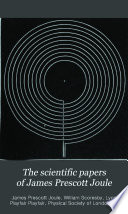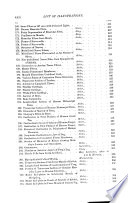 Heat is a very brisk agitation of the insensible parts of the object, which produces in us that sensation, from whence we denominate the object hot ; so what in our sensation is heat, in the object is nothing but motion. Heat is a very brisk agitation of the insensible parts of the object, which produces in us that sensation, from whence we denominate the object hot ; so what in our sensation is heat, in the object is nothing but motion.  Heat: A Mode of Motion - Page 27by John Tyndall - 1868 - 520 pagesFull view Heat: A Mode of Motion - Page 27by John Tyndall - 1868 - 520 pagesFull view - About this book
 | Henry Kiddle - 1883 - 296 pages
...particles is modified also ; it is not sluggish, but hurried and with violence." Locke said: "Heat is a very brisk agitation of the insensible parts of the object, which produces in us that emotion from which we denominate the object hot ; so that what in our sensation is heat, in the object... | |
 | James Prescott Joule - 1884 - 706 pages
...&c. &c. &c.) [' Philosophical Transactions,' 1860, Part I. Read June 21, 1849.] (PLATE II.) " Heat is a very brisk agitation of the insensible parts...denominate the object hot ; so what in our sensation is /"/••/, in the object is nothing but motion." — LOCKE. " The force of a moving body is proportional... | |
 | James Nasmyth, James Carpenter - 1885 - 374 pages
...motion and nothing else." Locke defines heat as "a very brisk agitation of the insensible parts of an object, which produces in us that sensation from whence...sensation is heat, in the object is nothing but motion." Descartes and his followers upheld a similar opinion. Richard Boyle, two hundred years ago, actually... | |
 | 1886 - 552 pages
...utterance which of late years has been most widely circulated is the following. " Heat," says Locke, " is a very brisk agitation of the insensible parts...sensation is heat, in the object is nothing but motion. This appears by the way heat is produced ; for we see that the rubbing of a brass nail upon a board... | |
 | Charles Force Deems, John Bancroft Devins - 1886 - 508 pages
...brisk agitation of the inscrutable parts of an object which produces in us that sensation from which we denominate the object hot; so what in our sensation is heat, in the object is nothing but motion" This theory has been maintained and greatly illustrated by researches since the time of Mr. Locke.... | |
 | Adolphe Ganot, Edmund Atkinson - 1886 - 1054 pages
...heat and motion are '" be met with in the older writers, Bacon for example ; and Locke says, ' Heat is a very brisk agitation of the insensible parts of the object, which pTKiuces in us that sensation from whence we denominate the object hot ; ••• that what in our... | |
 | Marcellus John Thompson - 1887 - 232 pages
...are precisely the same as the laws of the communication of motion." Locke, later on,* insists that " what in our sensation is heat, in the object is nothing but motion." And John Tyndall, in his " Heat as a Mode of Motion " (a work which has placed him in the front rank... | |
 | Georg Ferdinand Helm - 1887 - 120 pages
...Wärmetheorie) fügt Anaxagoras , Empedokles und Aristoteles bei; Joule konnte den Locke'schen Satz zitieren: what in our Sensation is heat, in the object is nothing but motion; Rodwell (Phil. mag. [4] 24) hob Bacos Anrechte hervor und Bohn (Phil, mag. [4] 28 und Ann. de chim.... | |
 | John Gray McKendrick - 1888 - 560 pages
...of heat. So long ago as the beginning of the 18th century Locke wrote the following passage : "Heat is a very brisk agitation of the insensible parts...the object, which produces in us that sensation from which we denominate the object hot ; so what in our sensation is heat, in the object is nothing but... | |
 | W. S. Cassedy - 1888 - 236 pages
...heat." That motion may be a cause of heat, was the opinion of the celebrated Locke He says : "Heat is a very brisk agitation of the insensible parts...object, which produces in us that sensation, from "which we denominate the object hot; so that what in our "sensation is heat in the object is nothing... | |
| |